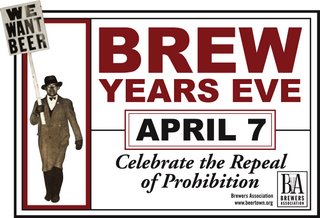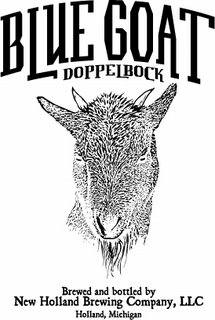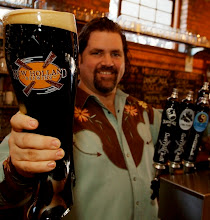Brew Years Eve II
Brew Year’s Eve marks the anniversary of the repeal of prohibition, and more specifically the day it all started with the legalization of beer, April 7, 1933. I believe it is absolutely essential that we stand up and celebrate our industry’s right to not only exist, but to strive for greatness. Some of you may assume that as a part of a local microbrewery, it’s a standard case of self-preservation, but it is much more than that. I argue that our country, our state and our local communities are more vibrant, interesting and considerably less divided as a result of embracing the relationship with quality food and drink and those who provide it.
Food and drink are two tenets of the good life. Drink, however, has had to fight its way back into our culture from some very dire times. Prohibition did little to dry up our country, as its advocates had hoped would happen. Instead, it dried up historic breweries, distilleries and vineyards, and sent the production of alcohol to the hills, or across borders. It pushed the sale of alcohol into back alleys and speakeasies while money and control went into the hands of criminals. This move decreased quality and safety while criminalizing many otherwise law-abiding citizens.
Our highly-regulated industry shows its history every day. In order to wrestle order from the predictable period of chaos and lawlessness, very strict and detailed rules were enacted. Brewers are licensed and governed by state and federal laws with details, some left from the days of repeal, that would astound professionals in most other industries. To this day, brewers, distributors and retailers face extreme opposition that fills their path to market with many obstacles. Additional excise taxes, restrictions as to how we advertise and to whom we sell, as well as limitations on even where and what days our products can be sold are facts of life to which our industry has had to adapt at great cost.
Nonetheless, today is not the day to discuss the ins and outs of regulation. It is not the day to debate the opponents of our trade who demonize our craft. It is a day to celebrate. We celebrate that the art of brewing is alive and well, and that it enhances our quality of life. We celebrate that craft brewing has culturally revitalized our country which now boasts nearly 1,400 breweries that employ more than 33,000 Americans. We raise our glass to the right to raise our glass – and hope you will too. I hope you savor your next beer as I will, and appreciate that by and large, prohibition is only a part of history.
Food and drink are two tenets of the good life. Drink, however, has had to fight its way back into our culture from some very dire times. Prohibition did little to dry up our country, as its advocates had hoped would happen. Instead, it dried up historic breweries, distilleries and vineyards, and sent the production of alcohol to the hills, or across borders. It pushed the sale of alcohol into back alleys and speakeasies while money and control went into the hands of criminals. This move decreased quality and safety while criminalizing many otherwise law-abiding citizens.
Our highly-regulated industry shows its history every day. In order to wrestle order from the predictable period of chaos and lawlessness, very strict and detailed rules were enacted. Brewers are licensed and governed by state and federal laws with details, some left from the days of repeal, that would astound professionals in most other industries. To this day, brewers, distributors and retailers face extreme opposition that fills their path to market with many obstacles. Additional excise taxes, restrictions as to how we advertise and to whom we sell, as well as limitations on even where and what days our products can be sold are facts of life to which our industry has had to adapt at great cost.
Nonetheless, today is not the day to discuss the ins and outs of regulation. It is not the day to debate the opponents of our trade who demonize our craft. It is a day to celebrate. We celebrate that the art of brewing is alive and well, and that it enhances our quality of life. We celebrate that craft brewing has culturally revitalized our country which now boasts nearly 1,400 breweries that employ more than 33,000 Americans. We raise our glass to the right to raise our glass – and hope you will too. I hope you savor your next beer as I will, and appreciate that by and large, prohibition is only a part of history.




